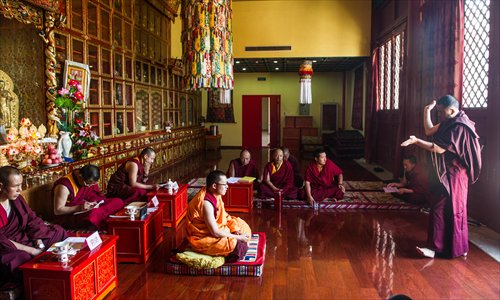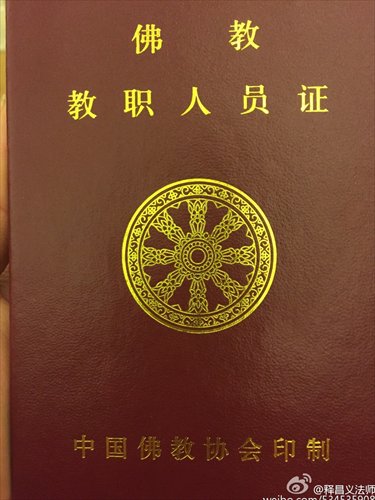Monks rebuff allegations that religion is under tighter control
Buddhist monks in China now have to apply for certificates to practice their religions across the mainland. It has been reported that clerics from other religious groups like Taoists and Catholics will also be required to apply this year. While religion and politics have been intertwined throughout the history, experts have called for 'desensitization' of religious affairs in the officially atheist country.

During a graduate exam for Nyingma sect lamas, a student (sitting in the center) of the High-level Tibetan Buddhism College of China is challenged. Photo: Li Hao/GT
Master Yancan, a well-known Buddhist monk in North China's Hebei Province, has received his certificate from the government that proves he's not a fake.
Resembling a passport, the certificate records his religious name, secular name, national ID card number and a unique number assigned to every individual religious figure.
Monks from East China's Zhejiang Province even have a QR code on each certificate, which can help prove the document is authentic.
China is now launching a massive campaign to store and check the identities of all religious workers, including releasing an online database of Tibetan "Living Buddhas" and issuing certificates with a unique number to each Buddhist monk.
The campaign started with Buddhist monks but soon extended to Taoist and Catholic priests, who will have to apply for certificates by the end of this year, according to reports by China Central Television. In addition, all religious sites nationwide are now required to apply for a National Organization Code Certificate and open a bank account.
If a priest's, monk's or religious site's certificate application is rejected by the authorities, the applicant will not be granted a certificate by the relevant religious association. According to the State Administration for Religious Affairs (SARA) regulations, those without certificates are forbidden from engaging in religious activities.
These changes aim to better "serve and manage" religious organizations, eradicate religious fraud and protect believers' rights, according to official statements.
In preparation for these new rules, SARA has spent three years collecting information about religious personnel nationwide and built up greater financial supervision of all religious sites.
All clergymen were required to hand in a resume-like table, providing their name, birthplace, ethnicity, marital status, education and work experience, as well as a photocopy of their household registration, ID card and a proof of identity issued by the temple or church to which they belong.
But several priests from the Catholic Church, known for its rigid hierarchy, have demonstrated their antipathy to the certificates. Priest Ruowang in North China said official identification cannot be enforced in Catholic churches. "If the Catholic Church issues the certificate, who will use it? If you require me to use it, I'd rather not go out," the priest told a report by UCANews, a Catholic news source in Asia, on January 22.
Quoting Ruowang and several other priests in the Chinese mainland, the report says the registration may only force them to go underground, which will then create more trouble for the government.
But some lamas and "Living Buddhas," an honorary title given to a lama chosen as the reincarnation of his late predecessor, have welcomed the official recognition.
"The opening of Living Buddhas name list is widely supported among Tibetan Buddhism believers in and out of Tibet regions," Dorshi Rinpoche, professor at the Northwest University for Nationalities in Lanzhou, Northwest China's Gansu Province, told the Global Times.
In recent years, quite a few phony Living Buddhas have swindled believers at home and abroad.
According to official statistics, China has around 1,700 Living Buddhas. But due to poor management, as well as the specific political and economic perks of the title, there are many self-proclaimed Living Buddhas. It is widely speculated that Beijing's Chaoyang district alone has nearly 300,000 self-proclaimed Living Buddhas.
"I had received many calls before from people who want to inquire about the identity of a Living Buddha. Some names they asked I have never heard of. With the database, they can check themselves now," Dorshi noted.
"The certificate will help prove our identity when we go to other religious sites, especially those who are not well-known," echoed Yancan, vice-chairman of the Buddhist Association in North China's Hebei Province and a Weibo celebrity with more than 45 million followers.

Certificate for Buddhist monks and nuns
'Never separated from politics'
But some believers are skeptical about their effect. "I think the key to distinguishing reality from fakes doesn't lie in whether a priest has a certificate or reputation, but in the sermons he preaches and his religious knowledge," said a Beijing Buddhist. "Besides, the certificate can be counterfeited or obtained through corruption."
Liu Peng, director of the Pushi Institute for Social Sciences in Beijing, an independent nonprofit think tank that focuses on religious legislation in China, is pessimistic about the new rules.
"The certificate will become a tool for governmental officials to easily veto those religious practitioners they don't favor," Liu told the Global Times.
Master Yancan dismissed worries that official recognition may lead to an increase in administrative interference in religious affairs.
"The religious affairs bureau just holds a copy of the monks' files and checks their authenticity, and it's the association which issues the certificates," he told the Global Times.
He admitted that not all monks have been approved by the bureau. "At a meeting, I heard that a few monks' files were rejected, but the reason was possibly that the information they submitted was not complete or true," he claimed.
Nonetheless, the government always considers religion a political issue, instead of a private or cultural issue. "Religious organizations have a huge number of followers and are highly organized, and the CPC, as the ruling party, does not want them totally out of its control," Liu Peng said, noting that there are units specializing in religion-related affairs in various government organs.
According to unofficial statistics which are widely accepted by Chinese religious experts, there are 300 million religious believers in the Chinese mainland, including 200 million Buddhists, 30 million Christians and 10 million Taoists. But the number of communists in China is fewer than 88 million.
Retired Party officials are banned from practicing religion and attending religious activities; and they should unswervingly fight against cult organizations, read guidelines which were published on the website of the State Council in February.
Liu said the certificate has made it easy for the government to exclude those who oppose government policies and control the number of religious workers, an idea called "false" by Master Yancan. "The religious authorities haven't enforced any clergy quota," he said. "There are only about 1,000 monks in Hebei and we need to grow that number," said Yancan.
Along with the certificate campaign, a priest from the Chinese mainland told UCANews on condition of anonymity that ideology-building classes on guiding religion according to socialist principles are increasingly being moved to churches.
Dorshi Rinpoche doesn't think political intervention is wrong.
"Throughout history, from India to Tibetan areas, Buddhism has never separated from politics. Not only Buddhism, the survival and development of all religions in the world are backed up by governmental support," he argued.
The management of religion is just part of the government's function to maintain social order, he added.
Due to the impact of modernization and commercialization, corruption thrives in many sectors, including Buddhism, such as acquiring the title of Living Buddha through bribery or connections. Thus it's essential to control the quantity and qualifications of Living Buddhas, he stressed.
To purify religion
In an article he posed on his Weibo in December, Jiangbian Jiacuo, a Tibetologist from the Chinese Academy of Social Sciences suggest that temples and venerable Buddhists should have a larger say in identifying Living Buddhas.
"There are observations that some officially recognized Living Buddhas boldly swindle love and money, stealing Buddhist statues and smuggling culture relics," he said.
Robert Barnett, director of Modern Tibetan Studies at the Weatherhead East Asian Institute, Columbia University, echoed Jiangbian's ideas.
"It's probably best to let experienced and respected members of a religion work out the best solutions to problems in their religion," Barnett told the Global Times via e-mail.
Li Anping, deputy general-secretary of the China Anti-cult Association, believes that the certificate system will help fight against illegal missionary work.
"In recent years, many new religions, some created by overseas Chinese, have boomed in China. Cloaking themselves in Buddhism or other religions, they promote some malicious ideas in remote areas or even in higher learning institutes," Li said.
In June 2014, the association listed 11 religious sects as cults, including the Church of Almighty God, the Society of Disciples, the Unification Church and Guanyin Famen.
Guanyin Famen followers are vegetarians and environmentalists, and also advocate the overthrow of the CPC, according to 2014 report by Inner Mongolia Daily.
"The certificates help set a boundary between religions and cults, and safeguard believers' rights and interests," Li noted.
Zhu Weiqun, chairman of the Ethnic and Religious Affairs Committee of the Chinese People's Political Consultative Conference, said recently that some fake Living Buddhas pose a threat to national security, as they collect money to sponsor illegal or even separatist activities in the Tibet Autonomous Region.
In a remark at a certificate awarding ceremony held in Zhejiang in October last year, Feng Zhili, director of the Zhejiang Commission for Ethnic and Religions Affairs, asked the authorities and association to grasp the opportunity to purify Buddhism and enhance patriotism.
However, several experts have called for the "desensitization" of religion. It's not right to magnify the problem just because of some religious frauds or extremists, said Zhuo Xinping, director of Chinese Religious Institute in an interview with thepaper.cn in August last year.
Liu said he believes creating a Religious Law is a fundamental solution. "Currently the administrative rules or regulations have no legal basis for those unlicensed religious sects," he said. He suggests the religious market be opened and religious administrations replaced with the rule of law.
Newspaper headline: Faith certificate